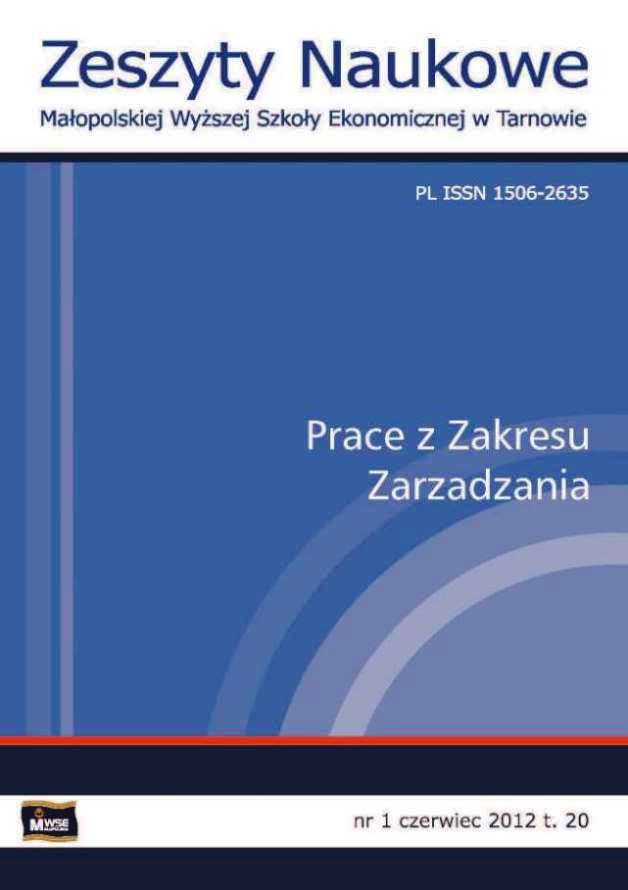Abstract
The author discusses the problem of building relations and cooperation between business and research entities, which, as of today, operate separately rather than symbiotically. She also points out the importance of establishing cooperation relations referred to as innovation alliances. In various publications one can find numerous theories about the need for cooperation between these two groups, which have been confirmed in practice. Well-known specialists and researchers analyzing this issue suggest transformation of the existing way of functioning into an open, innovative model, based on cooperation and use of mutual resources. In such alliances, the most important is an additional intellectual value or a value resulting from cooperation. In Poland, one observes dynamic changes both in the area of economy and educational system. Conditions created by the present knowledge-based economy stimulate development of networking and knowledge transfer between various organizations. All actions are aimed at creation of a friendly environment, referred to as pro-innovative for the functioning of an organization, which, in the long run, can reduce the gap between our country and the most developed ones. In practice, there are more and more cooperation initiatives of scientific units and companies, yet, they are not always successful (a so called failed partnership) due to numerous de-motivating factors. The article presents cooperation barriers resulting both from market conditions and internal factors dependent on a given entity.
References
Białoń L. (red.), Zarządzanie działalnością innowacyjną, Wyd. Placet, Warszawa 2010. ISBN 978-83-7488-153-1.
View in Google Scholar
Boguszewski P, Globalny indeks konkurencyjności 2011-2012, NBP, Warszawa 2011 [online, dostęp 14.01.2012]. Dostępny w Internecie: http://bioinfo.pl/pub/parp/20110907%20NBP.pdf.
View in Google Scholar
Drozdowski R., Zakrzewska A., Puchalska K., Morchat M., Mroczkowska D., Wspieranie postaw proinnowacyjnych przez wzmacnianie kreatywności jednostki, Wyd. Polskiej Agencji Rozwoju Przedsiębiorczości, Warszawa 2010. ISBN 978-83-931515-0-9.
View in Google Scholar
Ernst & Young Business Advisory, Instytut Badań nad Gospodarką Rynkową, Diagnoza stanu szkolnictwa wyższego w Polsce, 2009 [online, dostęp 5.03.2011]. Dostępny w Internecie: http://www.nauka.gov.pl/fileadmin/user_upload/Finansowanie/fundusze_europejskie/PO_KL/Projekty_systemowe/20100727_Diagnoza_stanu_SW.pdf.
View in Google Scholar
Forsal.pl, JB, TL, Najbardziej innowacyjne gospodarki świata - ranking państw z największą liczbą patentów, 2011 [online, dostęp 14.01.2012]. Dostępny w Internecie: http://forsal.pl/artykuly/507008,najbardziej_innowacyjne_gospodarki_swiata_ranking_panstw_z_najwieksza_liczba_patentow.html.
View in Google Scholar
Innowacyjność 2010, Polska Agencja Rozwoju Przedsiębiorczości, Warszawa 2010. ISBN 978-83-7633-025-9 [online, dostęp 26.01.2012]. Dostępny w Internecie: http://www.parp.gov.pl/files/74/81/380/10838.pdf.
View in Google Scholar
Kozioł L., Entrepreneur’s Business Models, „The Małopolska School of Economics in Tarnów Research Papers Collection” 2010, iss. 2(16).
View in Google Scholar
Lewiatan, Ponad 55 proc. firm inwestuje w innowacje, 2011 [online, dostęp 26.01.2012]. Dostępny w Internecie: http://pkpplewiatan.pl/opinie/gospodarka/2/ponad_55_proc_firm_inwestuje_w_in-nowacje.
View in Google Scholar
Materiały konferencyjne „Nauka i biznes - co nas łączy” z konferencji MARR, podsumowującej realizację projektu „Wiedza i Praktyka - klucz do sukcesu w biznesie”, 6.12.2011, Kraków.
View in Google Scholar
Matusiak K.B. Budowa powiązań nauki z biznesem w gospodarce opartej na wiedzy. Rola i miejsce uniwersytetu w procesach innowacyjnych, Szkoła Główna Handlowa - Oficyna Wydawnicza, Warszawa 2010. ISBN 978-83-7378-514-4.
View in Google Scholar
Ministerstwo Nauki i Szkolnictwa Wyższego, Reforma szkolnictwa wyższego, 2011 [online, dostęp 26.01.2012]. Dostępny w Internecie: http://www.nauka.gov.pl/fileadmin/user_upload/szkolnictwo/Reforma/20110628_MNISW_broszura_200x200.pdf.
View in Google Scholar
Onet.Biznes.pl, WAT: jak zarobić miliony na wynalazkach [online, dostęp 2.01.2012]. Dostępny w Internecie: http://biznes.onet.pl/,0,4987422.
View in Google Scholar
Pomykalski A., Model otwartej innowacji a zarządzanie sieciowe organizacją. W: J. Rybicki, T. Dryl (red. nauk.), Strategie sukcesu organizacji, Wydział Zarządzania Uniwersytetu Gdańskiego, Fundacja Rozwoju Uniwersytetu Gdańskiego, Sopot 2011.
View in Google Scholar
Stabryła A. (red.), Doskonalenie struktur organizacyjnych przedsiębiorstw w gospodarce opartej na wiedzy, Wyd. C.H. Beck, Warszawa 2009. ISBN 978-83-255-0237-9.
View in Google Scholar
© Copyright by Małopolska School of Economics in Tarnów. The articles are available under the Creative Commons Attribution NonCommercial-NoDerivatives 4.0 International License


